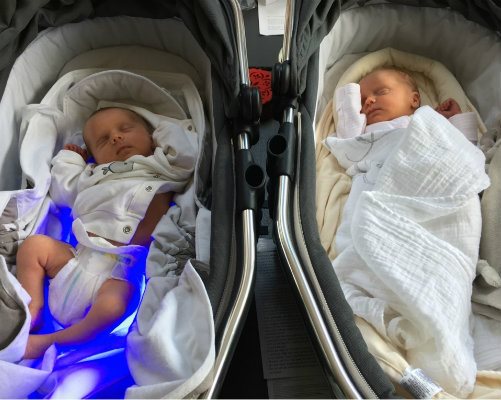Helping newborns with jaundice to go home earlier
Posted on Tuesday 2nd April 2019

Freya with the biliblanket and her twin sister, Megan.
Thanks to a successful pilot study at Evelina London, newborn babies who are affected by jaundice could soon be treated at home with a special light-up blanket.
Between May 2017 and May 2018, 10 babies with jaundice were discharged with a portable phototherapy device, called a biliblanket. Our team found that the device was safe, cost effective and welcomed by parents who were able to bond with their newborns in the comfort of their own home.
Jaundice is a common condition that causes yellowing of the skin and the whites of the eyes, affecting around 60% of newborns and 80% of babies born prematurely. It is caused by the build-up of bilirubin in the blood, a yellow substance produced when red blood cells, which carry oxygen around the body, are broken down. Babies with very high levels of bilirubin risk developing permanent brain damage if they are not treated.
Dr Gosia Radomska, neonatal associate specialist at Evelina London, explains: “One of the most common ways to treat jaundice is with phototherapy, which involves placing the baby under a therapeutic blue light in an incubator.
“We have found that babies who are strong, growing and are otherwise healthy are suitable for home phototherapy treatment. This means families can stay together and go home sooner, while freeing up beds and cots in the hospital.”
Zoe Wingfield, 41, gave birth to her twin daughters Freya and Megan six weeks early in May 2017. Although both girls received phototherapy treatment for jaundice at the hospital, Freya required treatment for longer, so she was one of the first newborns to be offered a biliblanket.
Zoe, from Battersea in London, said: “I had been in hospital for over a week before the girls arrived and then a further week once they were born so it felt like I had been there forever.
“We couldn't wait to get home and settle our babies, so being able to take them together made a huge difference. The support we received was amazing and we felt confident treating Freya at home because we had used the biliblanket on the ward with Megan.
“I look back at photos and it’s hard to believe they needed any extra help because you wouldn’t know now that they were premature.”
The treatment is now being used routinely by the maternity team at St Thomas’ Hospital, which is co-located with Evelina London. Babies are considered for home treatment if they have been receiving phototherapy on the postnatal ward for at least 48 hours, have stable or falling bilirubin levels and are able to feed. Parents are trained to use the biliblanket and an outreach nurse from the neonatal unit visits them daily to test the baby’s bilirubin levels.
Dr Radomska said: “Home phototherapy treatment is not routine in the UK, but it could benefit more babies across the country if other hospitals considered treating babies in this way, with the right training and safety measures in place for parents. The outreach nurses are also absolutely key to making this a success.”
Our team is due to present the study results to the Royal College of Paediatrics and Child Health conference in May. They have already presented data to the British Association of Perinatal Medicine in September 2018 and at a conference in Paris.
Our Evelina 150 Stories
This article is part of a series of Evelina 150 Stories that we are sharing in celebration of our special 150th anniversary year.
150 years ago, Evelina London was born out of love, when Baron Ferdinand de Rothschild founded the hospital in memory of his wife, Evelina. Since 1869, we've been saving lives, improving health and inspiring better futures.